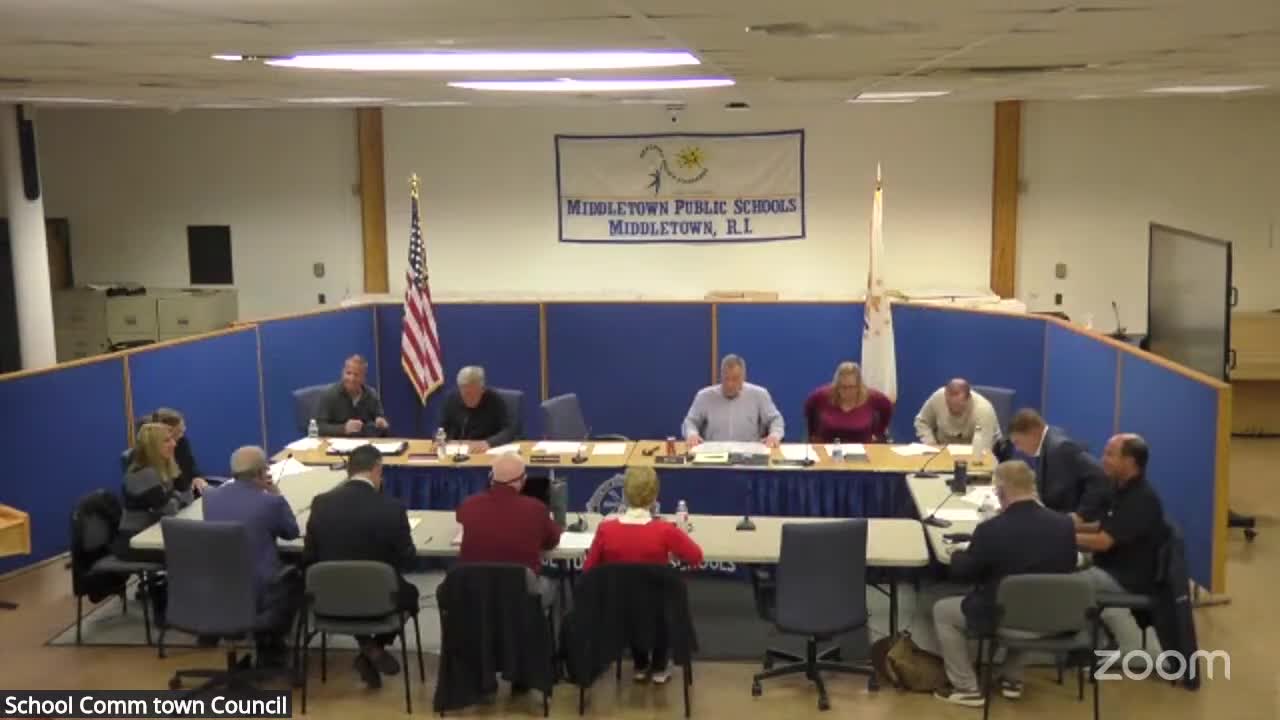Middletown school committee rejects Newports renewed regionalization push; council says not now but open to talks
Get AI-powered insights, summaries, and transcripts
Subscribe
Summary
The Middletown School Committee voted unanimously to oppose a Newport resolution to restart school regionalization, directing its superintendent not to engage. Middletown Town Councilors debated the request, with several saying the topic is premature given ongoing school construction and uncertain state funding; some councilors supported forming a
The Middletown School Committee on a September 2025 joint meeting with the Middletown Town Council announced it will not support the City of Newports Aug. 13 resolution to restart regionalization of the Newport and Middletown school districts, and the committee directed its superintendent not to engage in regionalization efforts for the time being.
Chair Gregory Hewitt read a statement on behalf of the committee saying the vote was unanimous (4-4-0 with one recusal) and that "chasing an undetermined, uncertain funding stream with daunting timelines, questionable outcomes with many significant unknowns, while knowing that approval would ultimately result in a loss of school committee autonomy is unwise and has no support" from the Middletown School Committee.
The committees statement noted that Middletown voters approved a bond to build two new schools after the 2022 regionalization ballot failed in Newport, that the local construction program is underway, and that there is currently "no current or pending Rhode Island legislation that guarantees an approximately 80% reimbursement rate for regionalization," language the committee used to explain its decision.
Town councilors who spoke at the joint meeting split on how to proceed but commonly said any next step should not be rushed. Council members repeatedly cited the districts active capital programnew school construction and related workand the superintendents workload as reasons to delay. Several councilors said they would support forming an academic integration advisory committee or other limited, collaborative steps to gather information, but they stopped short of endorsing immediate legislation or a special election.
The issue of state funding timing anchored much of the discussion. Gregory Hewitt read an email exchange with Mario Reno of the Rhode Island Department of Education (RIDE) in which Reno wrote that RIDE "does not have any written agreements between Newport and Middletown regarding funding or bonuses" and that the 2022 enabling legislation that previously provided reimbursement language "expired since the question was not approved by the voters in November 2022." Hewitt said RIDE told him it could not confirm any reimbursement rates without seeing specific proposed legislation.
Councilors and school committee members also raised procedural and practical constraints: one speaker noted a special election to put regionalization before voters would cost Middletown about $25,000 and that, absent enabling legislation and voter approval in both communities, the reimbursement promises discussed earlier would not be guaranteed. Speakers on both sides repeatedly emphasized that any final decision would ultimately be for the voters.
Representative remarks included Councilor Paul (name as used in the meeting), who described regionalization as driven by concerns about student population, program sustainability and dollars but said "if it's about the students, then step up and let's at least have a conversation with the community." Superintendent Billy Niedemeyer (referred to by speakers) was praised by multiple speakers for recent improvements in district performance, a point used by several councilors to argue that Middletown should avoid disrupting current momentum.
Several speakers urged that any advisory committee include educators and district staff, not just elected officials or members of the public, so the group could produce actionable, academically grounded recommendations. Others warned that an academic advisory committee with no clear charge or membership could generate nonbinding recommendations and unrealistic expectations.
No formal vote to regionalize was taken. The council approved a motion to discuss the town administrators memo (dated Aug. 26, 2025) and moved the matter into further consideration; councilors suggested placing the appointment of any advisory-committee representatives on a future agenda while many members said that, given current projects and uncertain funding, the right answer for now was to delay any binding action.
Next steps described at the meeting included: potential placement of an item on a future council agenda to define an academic integration advisory committee, continuing informal discussions with Newport officials, and seeking clearer written guidance from RIDE about what, if any, reimbursement language would be available under new legislation. The Middletown School Committee stood by its resolution opposing the Newport resolution and restated that it has not authorized the superintendent to pursue regionalization.
(Reporting note: direct quotes and attributions in this article are taken from the joint meeting transcript of Middletown officials. Where the transcript used only a given name or an unclear surname, the article uses the name as spoken in the meeting.)
